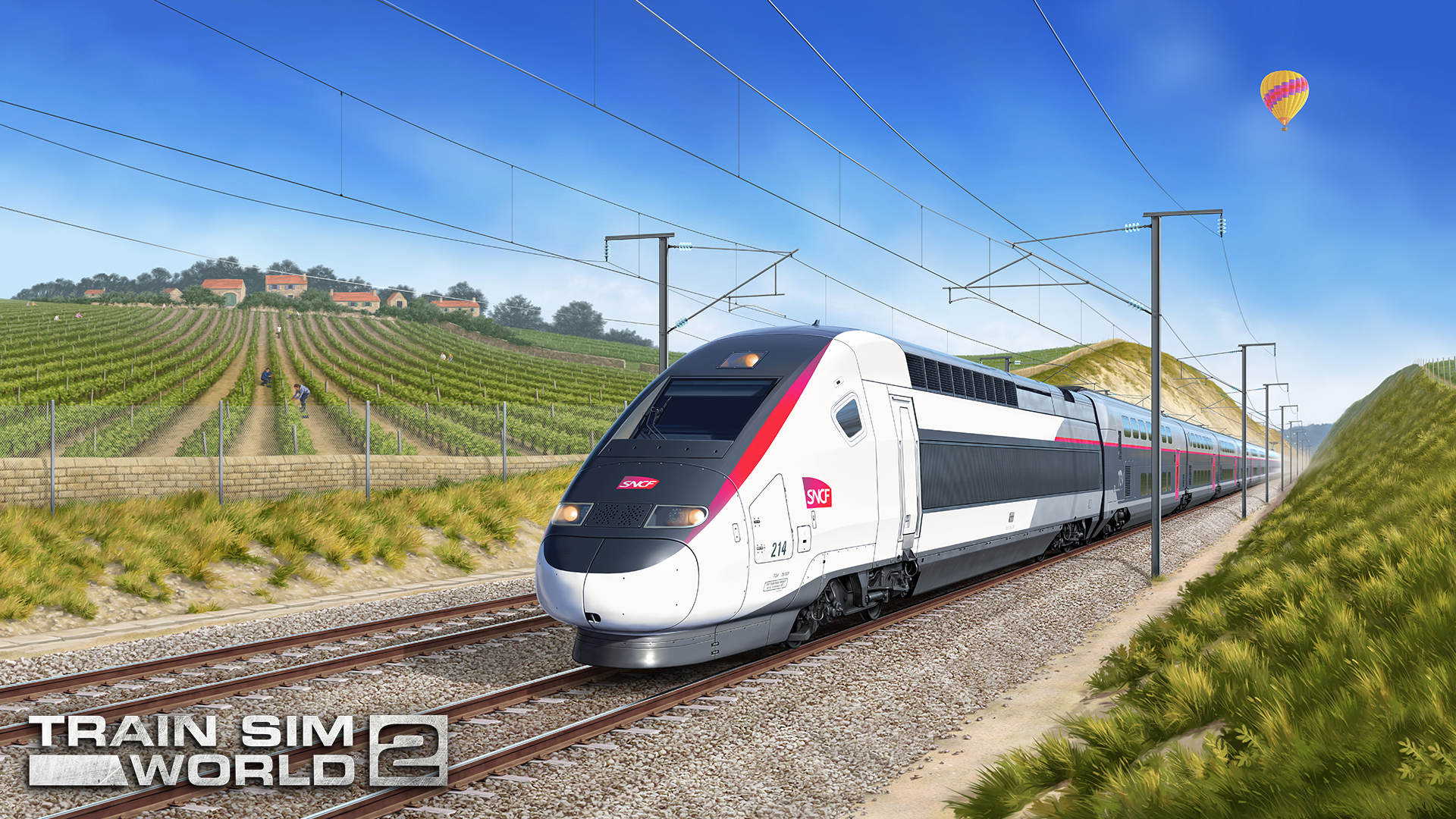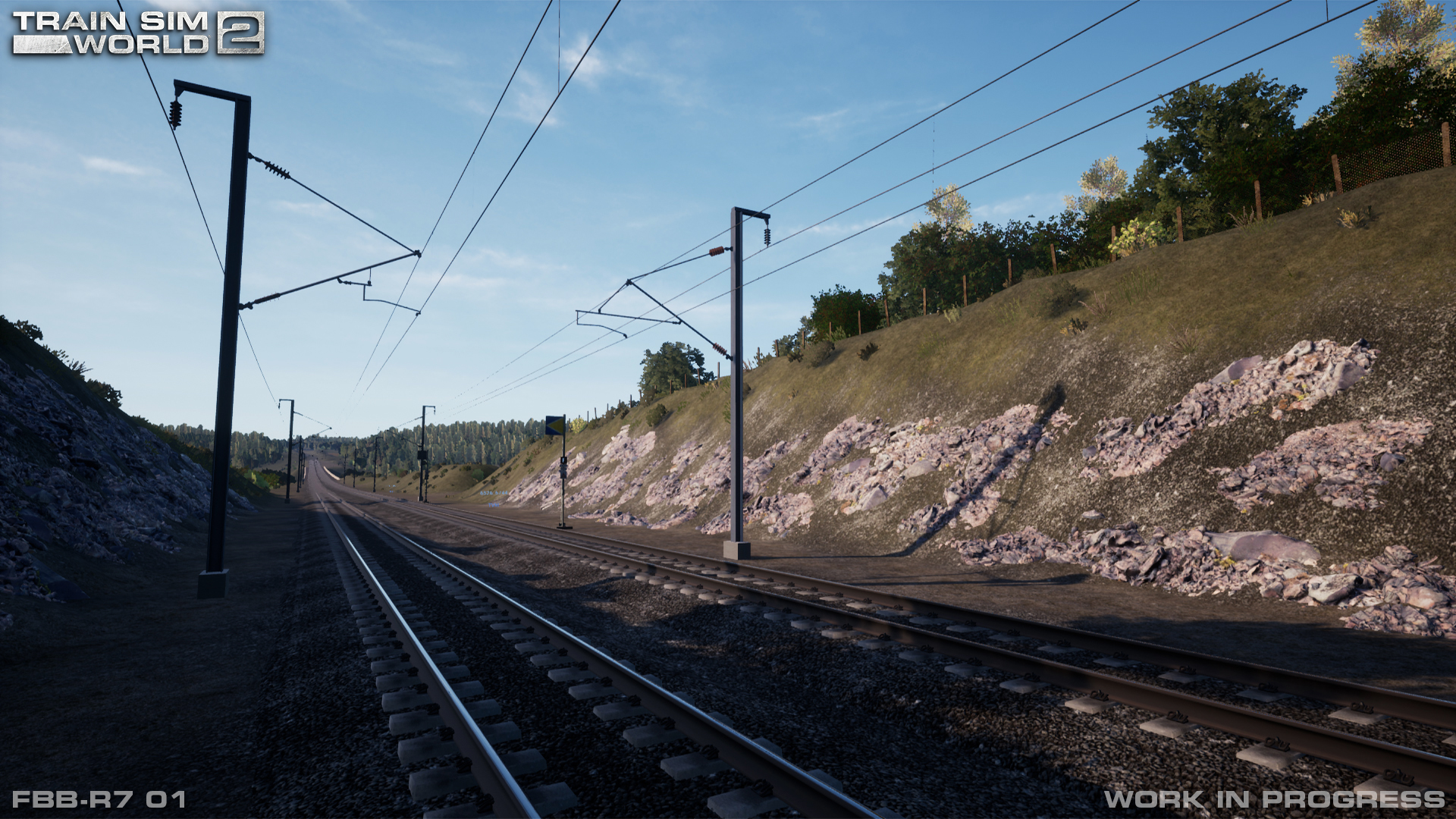Train Sim World
Train Sim World 2 - Building LGV Méditerranée

We chat to the development team about building the first French route for Train Sim World 2
Before we get started can you let us know what you both do here at Dovetail?
Jess: I am the Senior Environment Artist responsible for creating the in-world environment art. Within the team we have dedicated route artists who are responsible for actually building the world like a level builder would so this includes props, track elements and scenery.
Matt: I am the Senior Producer. I look after the team generally, watch over the vision of the product and where that’s going. More specifically I lead the track, signal and gameplay teams. I drive the game play that’s being created and help those teams deliver the awesome stuff.
What do you do first when you build a route?
Jess: It’s a mixture of things from multiple teams who are all interconnected. The beginning of the route will normally start with the track team and they will generate the “tiles” that we build the world from, to do this we source DEM data (Digital Elevation Models). This then creates the tiles with elevation based of that data, and the track team will then lay the track based on Google Earth or track documents a bit like blueprints.
Once we have that we get art involved and they will start building the route itself using assets we have. So, foliage and buildings, whilst sculpting the landscape based off video and photo references. We then build up from that in stages.

What is the biggest challenge with recreating a real-world route?
Jess: We like to be as accurate as we can. We focus on the key feature areas such as the stations and the areas around it including key game play areas like depos and yards.
We will of course base everything off real world imagery but if a road has to be slightly too far to the left to make sure it works scenery wise then that’s an artistic choice we will make. We also have to edit things sometimes to have functioning NPC’s. Within an artistic license we try to be as accurate as we can be but our main aim really is to give the correct feel for the route, that is our priority.

How do you build a route and was LGV any different?
Jess: We have gone about this route slightly differently to how we normally would. We have introduced a new pipeline which is using our new tool.
Matt: When you go to websites such as open street map and Google Earth and you see the map, what’s powering these maps is data. Through sites like this we can get access to that raw data. The tool that we are building is then turning that raw data into instructions in Unreal to say “paint this terrain” for example.
Jess: Our lovely tech team has put in the ability to extract tiles from the DEM data and using a collection of scripts autogenerate landscape painting and asset placement. They then apply our landscape material using this and they will pre paint areas such as roads, concrete and track ballast. They can also prepopulate areas with meshes, so this includes things like tree lines, fencing and hedges so that when we come to our initial stage with the new tool, we’ve skipped a couple of steps at the beginning so it’s not so much a blank canvas.

Matt: Traditionally we build our routes by hand which can often be hard to perceive. The craftmanship is no different to how building a model railway would be. For example, if you want a tree you place a tree, now multiply that by 60 scale miles and that gives an idea of the weight of work the environment teams take on.
We are frequently asked by players “How do we start delivering longer routes?” Because one of the key things with faster trains is that you require longer routes to enjoy them properly. Either projects need to take ridiculously long to do, or we need to find ways to have better tools and this tool allows us to start autogenerating content.
We need to be careful how we proceed down this line, this is very much our first path down autogeneration. This isn’t dynamic autogeneration, what’s happening is it generates some content and then the environment team will take a look and do things with it so we will retain that hand crafted feel. What it does mean is we are now able to come at it at step 3 instead of step 0.
Jess: It’s much nicer for the environment team to pick up a tile and see it’s already started, nobody likes a blank canvas and this just makes a project less daunting to begin.
Matt: From here we need to decide what the next step we take will be, so in the future we automate more and more but we don’t automate things that are going to detract from the experience and as a result make everything repetitive. We want to ensure we end up with the same quality we would have had if everything had been done by hand.
What's unique to this route?
Matt: This will be our fastest route on Train Sim World 2 at an incredible 320 Km/h. It is the first route that we’ve done that deploys the TVM430 signals and also uses the French KVB in cab signaling system.
There’s a whole lot of firsts but the environment side of this route is really interesting because it’s an absolute rollercoaster and it has some of the fiercest gradients you can imagine.
At 320 Km/h you really feel those gradients and you will find they are more severe than you might have previously experienced, this is because Train Sim World 2 is better able to cope with those really steep gradients and perform better while at high speed.

We will be showing more on LGV Méditerranée in the coming weeks, including taking a closer look at the TGV Duplex. Make sure you’re following @TrainSimWorld on Twitter and Facebook for regular updates.
Images displayed in this article may depict content that is still in development. The licensed brands may not have been approved by their respective owner and some artwork may still be pending approval.
11
57
4
6
Train Sim World
5y
Train Sim World 2 - Building LGV Méditerranée
Train Sim World
1d
Stuttgart - Heilbronn: Release Date & Timetable Info
Train Sim World
1d
Xbox Add-on Sale: Now On!
Train Sim World 6
3d
Season of Reveals 2025 - Week 1
Train Sim World
27 Nov
Frankenbahn: Stuttgart - Heilbronn: Coming Soon!
Train Sim World
25 Nov
TfW Class 142 - Out Now!
Train Sim World
19 Nov
TfW Class 142 - Coming Soon!
Train Sim World
18 Nov
Cargo Line Volume 5: Nuclear - Out Now!
Train Sim World
13 Nov
Santa Fe on Cajon Pass - Out Now!
Train Sim World
12 Nov
Cargo Line Volume 5: Nuclear - Coming Soon!
Train Sim World 6
6 Nov
Train Sim World 6 Roadmap - November 2025
Train Sim World
5 Nov
Santa Fe on Cajon Pass - Coming Soon!
Train Sim World
28 Oct
Train Sim World 6: Post-release Patch Summary, Oct 28th
Train Sim World
21 Oct
WCML: Birmingham - Crewe: Out Now!
Train Sim World
15 Oct
New Announcement - Metro Rivals: New York
Train Sim World
14 Oct
WCML: Birmingham - Crewe Release Date
Train Sim World 6
9 Oct
Train Sim World 6 Roadmap - October 2025
Train Sim World
8 Oct
First DLC, WCML: Birmingham - Crewe: Coming Soon!
Train Sim World
3 Oct
Train Sim World 6 - From the Players
Train Sim World
30 Sep
Train Sim World 6 Out Now!
Train Sim World
22 Sep
Train Sim World 6 - New Trains at Newton Abbot!
Train Sim World
18 Sep
1 Week To Go! Everything you need to know: Train Faults, Random Events and more.
Train Sim World
17 Sep
Morristown Line: From the Railfan
Train Sim World
16 Sep
Train Sim World 6 – New Route for New Jersey
Train Sim World
8 Sep
Train Sim World 6 – New Horizons to Leipzig

